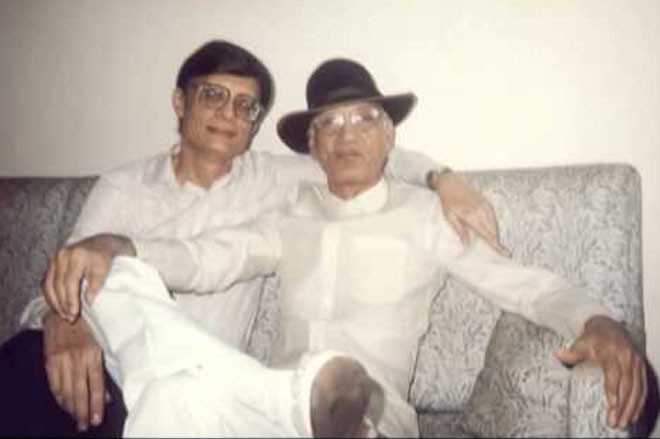
An endeavour to preserve the journey of Indian cinema’s veteran lyricists, melody-makers and singers

Since the release of the first Indian sound film Alam Ara in the Majestic Cinema of Bombay on March 14, 1931, songs and music have been an integral and indispensable part of the movies produced in both India and Pakistan. Although the pattern and style of songs has changed over the last 85 years, people still throng the cinema houses if a movie has a good musical score.
Musicologists and practitioners of music also endowed with the art of writing have been sharing their knowledge and experience through articles and books authored for the benefit of people interested in the field. They describe the effort and genius that is involved in creating a song which provides pleasure and solace to the listener. The combined endeavours of the lyricist, melody-maker and singer create a song. Those blessed by nature with high talent of writing poetry, composing tunes or possessing a voice with a rare quality, produce melodies which people never forget. The golden era of film songs from 1950s to 1970s brought many such people to the forefront, who left an everlasting niche image in the realm of cinema.
Sultan Arshad, author of the recently published book, The Musical People has such a vast and deep knowledge of film songs that it impresses other musicologists, who after meeting him find themselves wanting. It was just a coincidence that the author got posted in Mumbai (then Bombay) from 1987 to 1996 as Pakistan International Airlines manager for Western and Southern India.
Having great love for immortal film songs, the author enjoyed his posting as during this period he happened to develop strong friendships with a number of music directors, singers, lyricists and other reputed film personalities. These included music directors Naushad, Anil Biswas, O. P. Nayyar, Kalyanji-Anandji, Laxmikant-Pyarelal, Ravendrajain, R. D. Burman; singers Talat Mehmood, Manna Dey, Asha Bhosle; lyricists Majrooh Sultanpuri, Prem Dhawan, Anand Bukshi; film-makers Gulzar, Yash Chopra and Ramesh Sippi etc.
The book mostly comprises the author’s articles which were published by the Star Weekend and the Herald in 1990s and the decade commencing the year 2000. During the golden era, the film songs of both India and Pakistan were made popular amongst people who watched movies with keen interest and also listened to the charming melodies broadcast by local radio stations, All India Radio and the most favourite Radio Ceylon.
Living in Pakistan, one could only get fascinated by the compositions of maestros such as Naushad, Anil Biswas, O. P. Nayyar and R. D. Burman, lyrics of Majrooh Sultanpuri and the songs of Talat Mehmood. However, the narration of their respective contributions to the Indian cinema by the author is unique and special as his close friendship with the legends of Indian film music puts him in an enviable position. The exchange of thoughts on music between the author and the heavyweights was a privilege which no one else can boast of in Pakistan.
It has not been a smooth sailing for some of the above-mentioned stalwarts given the competitive and complicated world of cinema. Being a stranger, Naushad made a humble start and had to sleep on Bombay’s footpaths initially when he arrived in the city from Lucknow looking for an opportunity in films just a decade after sound was introduced in films. The book also provides a glance into the dark side of Mumbai’s glittering and glamorous film world and the callous behaviour of people at the helm of industry’s affairs. Some of the music directors that were once the most sought after were treated by the same people as strangers in the town once they could no longer give the hits.
The author had also developed personal rapport with Pakistan’s leading composers such as Khwaja Khurshid Anwar, Nisar Bazmi, Sohail Rana, Robin Ghosh; lyricist Qateel Shifai and singer Mehdi Hassan. Their struggle to reach the pinnacle of fame has been amply described in the book.
Besides articles on the accomplished sitar player Raees Khan, composer-actor Arshad Mahmud, singer Nayyara Noor and musicologist-writer-photographer S. M. Shahid, the author has comprehensively covered the life history and contributions to film music made by singers and actresses Noor Jehan, Suraiya and Khursheed. Khursheed, who migrated to Pakistan after the partition, had become famous for two of her movies, Bhagat Surdas and Tansen, in which she had shared acting honours as well as singing duets with the legendary singer-actor K. L. Saigal. There is also a detailed account of the talent and skills of brilliant composers Nisar Bazmi, Salil Chowdhry and Sajjad Hussain.
The book contains a list of 40 top songs of composer Naushad Ali besides Noor Jehan’s 159 Urdu and 61 Punjabi hit songs, thus providing a gist of their respective lifetime achievements in a nutshell.
The name of K. L. Saigal, a trendsetter for film songs of the golden era appears so many times in the book that a need is felt to have an exclusive article on him, which the author may add in the next edition of the book in addition to removing a few typographical errors. It is an interesting read for people with a deep attachment and interest in film songs of the subcontinent and those who also wish to know more about the lyricists, singers and the composers of those enchanting melodies.
The Musical People
Author: Sultan Arshad
Publisher: Paramount Books Pvt Ltd
Pages: 244
Price : Rs. 995